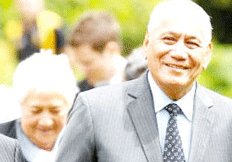
APIA: A letter to the editor from the Attorney-General Aumua Ming C. Leung Wai arrived on 28 October 2010.
Addressed to the Samoa Observer editor-in-chief, Savea Sano Malifa, the letter said certain “statements” that appeared in articles in the paper “may be defamatory” of the Head of State, “and necessary action is being considered by my Office.”
Aumua’s letter reads:
HEAD OF STATE
1. I write to defend the Office of the Head of State held by His Highness Tui Atua Tupua Tamasese Efi by correcting the erroneous statements published in your newspaper dated 28th October 2010, namely:
(a) The statement by Palusalue Faapo II that the Head of State’s assent to the Casino and Gambling Control Act 2010 (“the Act”) was “no surprise” since the Head of State “is no longer independent”…and ….”under the control of Tuilaepa and the government”; and
(b) The implication by your editorial that the Head of State’s assent to the Act meant that His Highness is in favour “casinos and gambling in our country”.
2. His Highness is obligated under Article 60 of the Constitution to follow the advice of the Honourable Prime Minister whether to assent or to refuse to assent to a Bill passed by the Legislative Assembly. In other words, His Highness does not have the discretion to refuse assent, if he was advised by the Prime Minister to assent to a Bill.
3. This interpretation of Article 60 is consistent with what was said during the Constitutional Convention Debates in 1960 where it was apparent that the intent of the drafters of our Constitution was for the Head of State not to have the power to act contrary to the advice of the Prime Minister to assent to a Bill passed by the Legislative Assembly. When proposed amendments to Article 60 were discussed in 1960, Professor Davidson (one of the drafters) addressed the Convention as follows:
“The proposal to add the words acting on the advice of the Prime Minister in clause 2 is intended to make it quite clear that the responsibility for advising the Head of State as to whether a bill should be assented to or not falls directly on the Prime Minister. Under this provision, the Head of state would be required to act on the advice of the Prime Minister [emphasis added], so that, if he was advised by the Prime Minister to assent to a bill and did not do so, the Prime Minister would have the authority to instruct the secretary of Cabinet to issue a document after 7 days to the effect that the assent of the Head of State was deemed to have been given, though actually the Head of State had not given it.
If assent was refused to a bill, it would therefore be refused on the advice of the Prime Minister, and the Legislative Assembly would be aware that that was the case. The Prime Minister would therefore, be required to answer immediately to the Legislative Assembly for the refusal to assent. That would make it certain that the Prime Minister would not dare to advise refusal to assent, unless some doubt had arisen as to the legality of the bill or clarification was needed as to some point in the bill….
…The reason for this provision, therefore is to place the responsibility on the Prime Minister, because it is part of his duty to take responsibility in matters of government policy and to safeguard the Head of State from getting in a position in which he could be critici\sed for taking sides in matters on which different people in the country hold different opinions.” [emphasis added]
4. I have decided to quote this because I believe it is important that the public and your newspaper fully understand the reasons why our forefathers had decided for the Head of State not to have a discretion when it comes to the assenting of Bill’s passed by the Legislative Assembly.
If His Highness has concerns with a Bill, then he may of course discuss this privately with the Prime Minister but the effect of whether the Bill will be assented to or not rests with the Prime Minister.
5. Our system of Government is similar to that of other Commonwealth countries where the Head of State is regarded as being above and outside of politics.
6. It is therefore legally wrong and irresponsible to publish statements:
(a) that infers that the Head of State can refuse to assent to a Bill passed by our Legislative Assembly, and/or
(b) that infers that our Head of State is involved in politics (when this is incorrect).
7. Such statements may be defamatory and necessary action is being considered by my Office, particularly if you and those responsible for these statements do not take immediate remedial action.
8. Because of the importance of this issue and the need to avoid similar incidents from arising again, other media outlets are copied with this letter.
Ma lou faaaloalo lava.
(Ming C. Leung Wai
ATTORNEY GENERAL
cc: Local Media.
Asked for a comment, Savea said: “We have no desire to enter into a legal argument that may diminish in any way, the authority and respect vested by Samoa in the Head of State and the office he holds.
“For that reason we extend our unreserved apology to His Highness, Tui Atua Tupua Tamasese Efi, and the people of Samoa, for the statement complained of.” - Sunday Samoan/Pacific Media Watch
Editorial (28 October 2010):
Now that the Casino law is a reality in Samoa, let's move on
Tui Atua consents to Casino law



